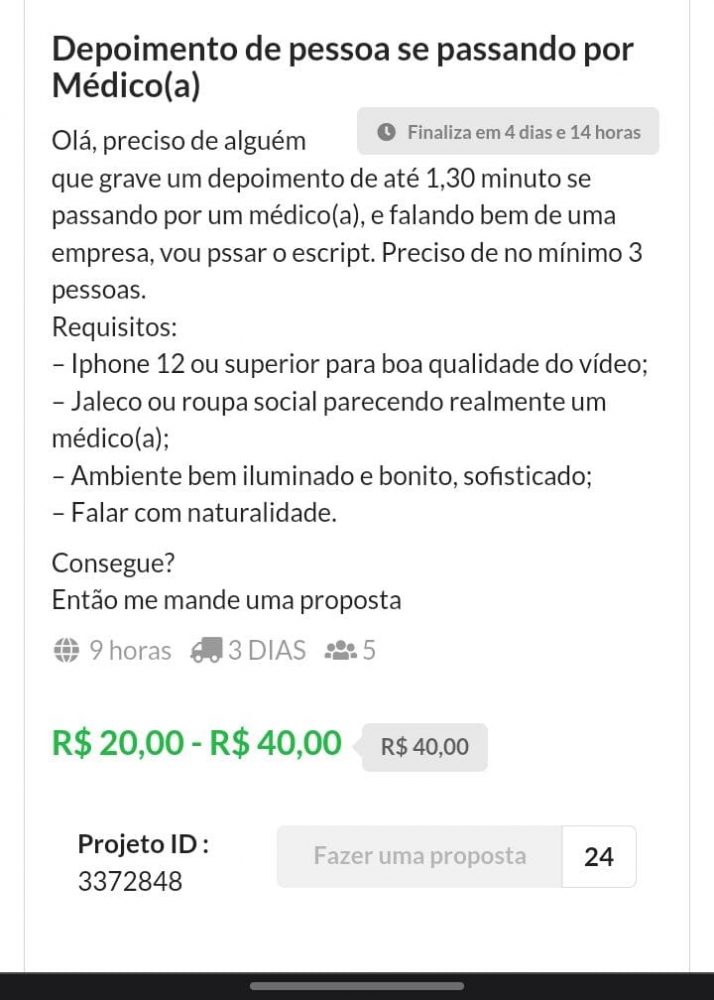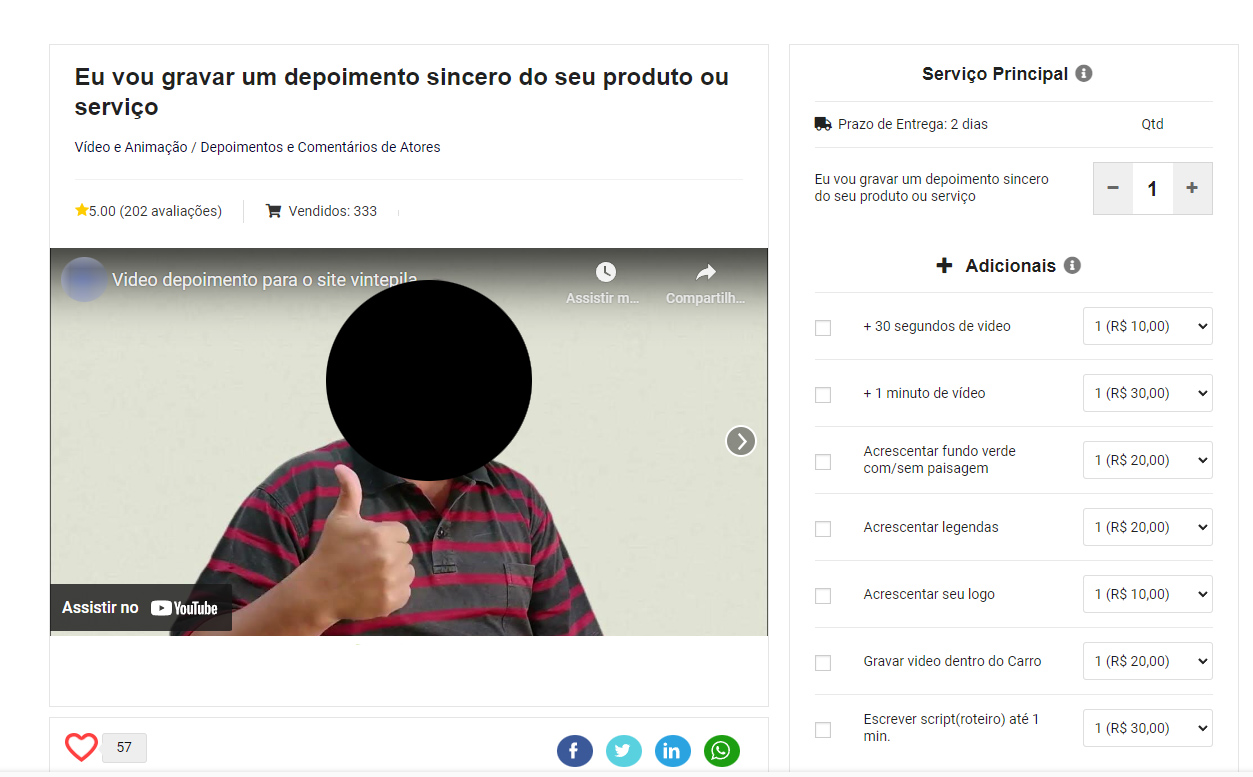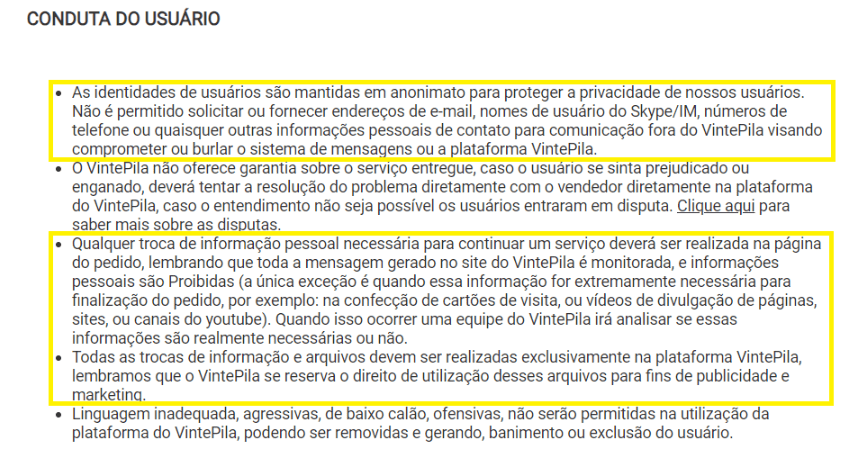Job sites even “offer” fake doctor’s testimonials for R$20
Fake video testimonials, fake product and service reviews, artificially increasing followers on social networks and Google search. For R$20, it is possible to find these and other services on VintePila and Vinteconto, Brazil’s online “bicos” platforms.
Originally aimed at hiring designers, announcers and other freelancers at affordable prices, these sites have ended up creating a parallel “influencer marketing” market that can expose workers to legal violations, according to experts polled by Reporter Brazil.
In the case of VintePila, for example, the report identified an advertisement in which the contractor asked the freelancer, dressed in a lab coat, to record a video impersonating the doctor and speaking well of a particular company.

Patricia Peck, a lawyer specializing in digital law, explains that the action may even violate section 282 of the Penal Code, regarding the illegal practice of medicine.
In another ad posted on VintePila, the freelancer is tasked with recording a video showing his own bank account, claiming to have earned money through a course on “how to earn extra income.”

Unlike VintePila, in which the contractor can also post ads requiring services, Vinteconto works as a virtual storefront limited to providers.
In other words, the platform only allows freelancers to offer their work, usually with slogans like “I’ll give my testimonial for your product.”
According to Patricia Peck, videos of apparently volunteered comments posted online, such as those found by the report, must be clearly exposed as propaganda.
Otherwise, these freelancers may be liable for crimes against the consumer relationship and even criminal offenses such as embezzlement.
ONE Reporter Brazil attempted to contact VintePile and Vinteconto, but did not receive a response by the time of writing. The article will be updated if the companies send a position.
The report spoke with a service provider about these platforms. Unemployed, he says he looked into the sites during the Covid-19 pandemic, out of a need for quick cash. Since then, he claims to have recorded around 50 testimonials.
In the first month, he reports that he received R$300 with VintePila. Today, however, due to being outnumbered by what he calls “desperate freelancers”, his monthly income does not reach R$100. Online courses, virtual casino apps and even sexual stimulants have already been the subject of testimonials he has recorded.

Asked about the accuracy of the products and services he helps sell, he compares the job to that of an actor in a TV commercial, as he must follow a script sent to him by the client.
“To me, that’s what a character is all about. I never stopped to think that there was that side there [de infração à lei]”, says.
ONE Reporter Brazil also investigated videos produced by freelancers from VintePila promoting sites accused of fraud such as “Retrato da Alma Gêmea”.
With more than 100 negative reviews on ReclameAqui, the app charges at least R$27.90 for a medium to draw a portrait of the customer’s supposed soulmate.
However, users report that the app sends repeated designs. There are also complaints from people who didn’t even receive their orders even though they paid for them. Others complain that they have not been able to return the amounts.
Contact from Reporter Brazil, the company also did not return as of this writing. The identity of the workers has been withheld to avoid possible virtual prosecution.
VintePila bills itself as “an online platform that provides places for sellers to offer their products or services and for buyers to buy those products or services.” In its terms of service, the website disclaims any responsibility for any violations of the law.
Likewise, Vinteconto’s terms also exempt legal liability, further informing that “users are prohibited from announcing to [sic] sale or purchase of products that are prohibited or in violation of applicable law.”
To prevent customers from exchanging contacts to negotiate services outside the platform, the companies advise that all ads and messages are reviewed by the platform’s own moderators before they go live. In this way, they end up being aware of everything that is announced or negotiated.

This moderation of messages and ads can get companies legally involved, says attorney Patrícia Peck. “Once he watches and becomes aware of an illegal act, he can be implicated for negligence if he doesn’t take action,” he points out.
VintePila and Vinteconto’s terms of service provide for the retention of 20% of all transactions made on their premises. For every R$20 sold on the site, only R$16 goes into the freelancer’s pocket.
“A person gets involved in such a service and, in the end, in addition to not making the money they wanted, they can still get involved in a legal problem,” says Peck.
Matheus Viana Braz, professor of Psychology at the State University of Minas Gerais (UEMG) and researcher of digital work, points out that sites like VintePila and Vinteconto are directly linked to a “prolongation of informality” in Brazil, in which workers are maintained through different nozzles.
“Now, in addition to working with Uber and iFood, there is also the possibility to work on these platforms,” he tells Repórter Brasil.
For Braz, the need to pay the bills leads people to accept “underhand” services, in gray areas of the law. According to the researcher, it is up to the platforms to take concrete measures to prevent the offering of potentially illegal services.
“If we expect this kind of work to be self-regulated by workers in some way, it’s not going to happen. They are there because they need money.”
#Job #sites #offer #fake #doctors #testimonials #R20
